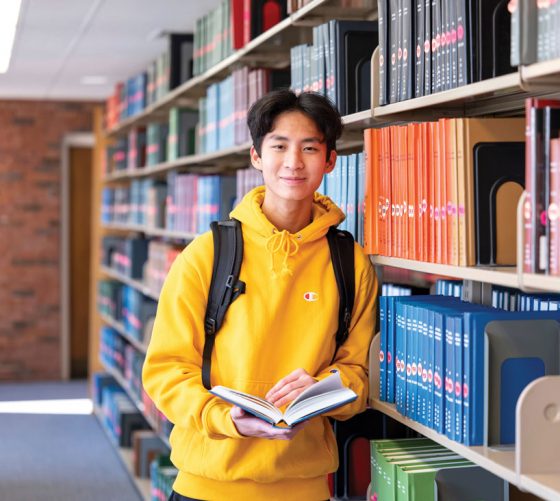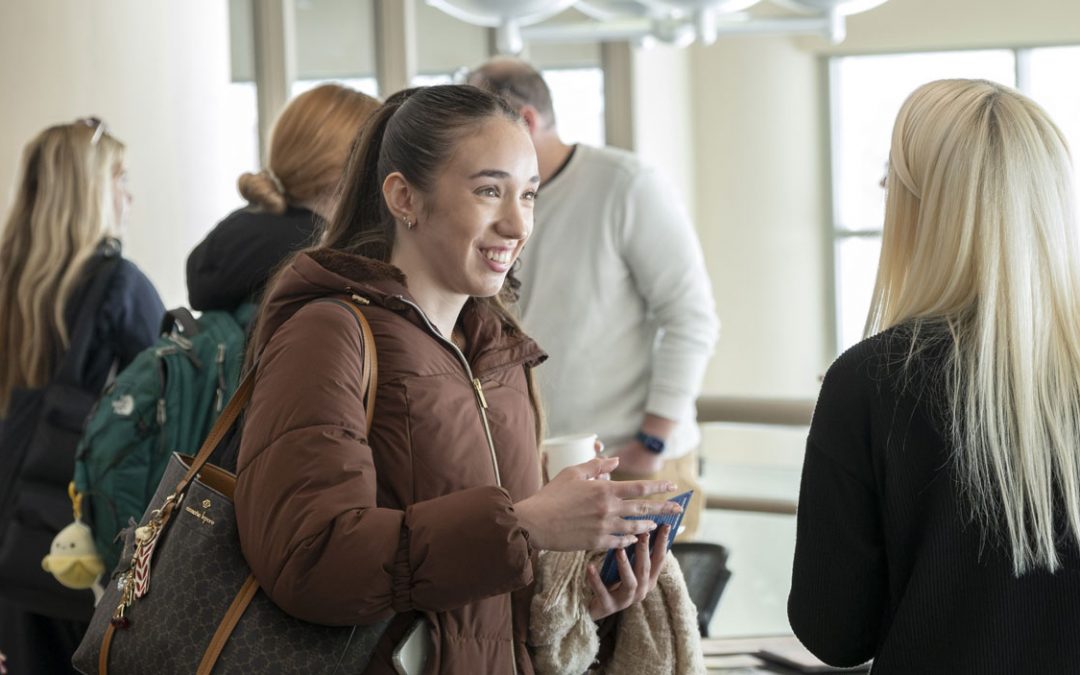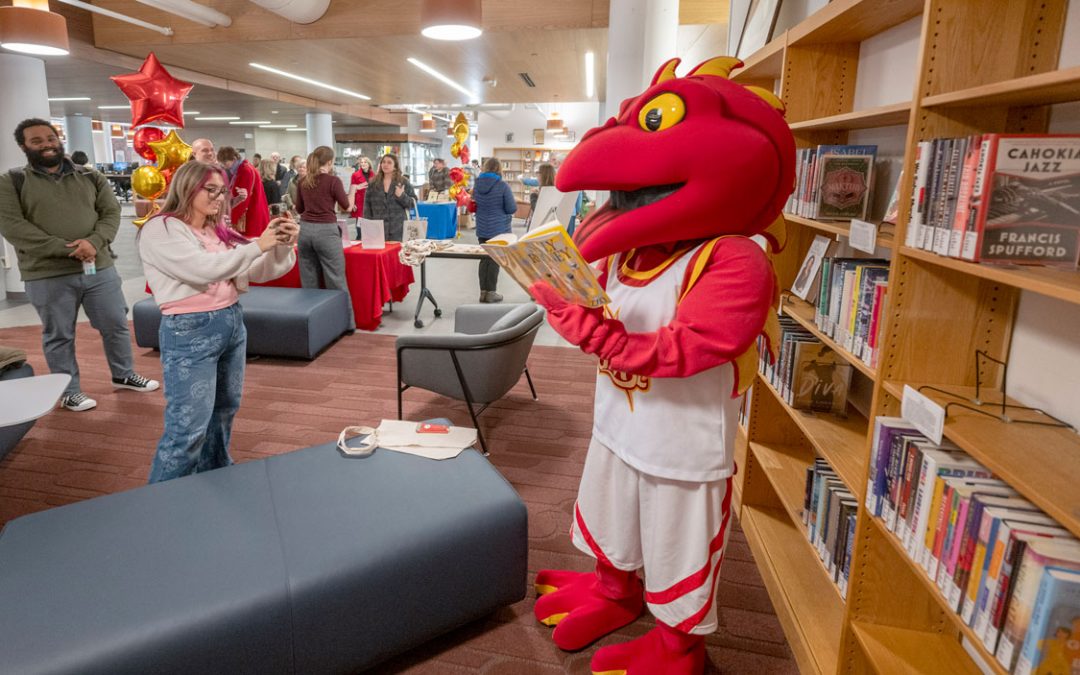
Over 30-plus years, UMSL’s ACP has grown into the largest dual-credit program in the state of Missouri and one of the most successful in the country. (Photo courtesy of Shutterstock)
By David Morrison
Ryan Ruamwijitphong is a 2022 graduate of Rockwood Summit High School in Fenton, Missouri. He is less than a year into his college career at the University of Missouri–St. Louis, and he is already a junior.
That’s because he brought 57 credits with him to UMSL from 18 different Advanced Credit Program classes that he took in high school.
“I wanted to get a head start in my education to graduate college earlier,” says Ruamwijitphong, who is studying biology. “I don’t have to take as many credits a semester compared to a regular college student doing undergrad for four years in order to graduate on time, so I have a lot more time to focus on every course that I am taking.”

Ryan Ruamwijitphong graduated from high school last year but is already a junior at UMSL because he came in with 57 credits through Advanced Credit Program classes that he took in high school. (Photo by August Jennewein)
The ACP is a dual-credit program that offers qualifying, high- caliber high school students in select schools the opportunity
to earn college credits and become familiar with the college experience while still in a high school setting. UMSL partners with dual-credit instructors at high schools around the St. Louis region who are qualified and meet the criteria of the Higher Learning Commission and the Missouri Department of Higher Education to offer courses for college credit to students at their home schools.
ACP courses are generally available to high school juniors and seniors with a 2.5 grade-point average or greater, as well as sophomores with a GPA of at least 3.0. Unlike Advanced Placement exams, college credit is awarded based on a semester or yearlong grade through the ACP. Director Kathleen Burns hopes that the ACP makes college more accessible to more students across the region.
“We’ve tried to make it so that any student who could possibly be successful in completing a college-level course could have access to these courses when they’re in high school,” says Burns, an assistant dean and director of UMSL’s early college programs.
The numbers say it all. When the ACP started at UMSL in the 1986-87 school year, there were 919 student enrollments – the total number of courses students are enrolled in through ACP – across 10 high schools in six districts. In 2021-22, those numbers ballooned to 12,255 enrollments across 88 high schools in 35 districts.
“It’s really incredible,” Burns says. “The number of courses we offer has grown, and we’ve been able to get a broader spectrum of students into all these different classes. My goal every year is to increase the numbers of students taking college classes via UMSL’s ACP, and making that reach – the UMSL partnership – grow and get better. Just being able to offer more and more to the high school students is awesome.”
UMSL’s ACP has grown into the largest dual-credit program in the state of Missouri and one of the most successful in the country. It has allowed thousands of students to dip their toes into the college experience while still in high school, allowing them to earn credit, accelerate their path through higher education and save money along the way.
“It’s a big deal to know that you’re already cutting it in a college class, that the doors to college are open to you,” says Jennifer McKnight, professor of graphic design at UMSL and the ACP liaison for art and design. “This piece feels like we’re truly serving our community by making these pathways clear.”
Setting the standard
Across the 88 high schools in the ACP, 517 adjunct teachers lead 1,032 sections in 90 courses covering 19 different subjects.
All of these courses offer high school students college-level education. The high school adjuncts’ relationship with their 29 UMSL faculty liaisons help make this so.
“We’re growing by leaps and bounds. We keep getting requests from high schools about adding new classes,” says Jenny Shrensker, teaching professor in the UMSL Department of Mathematics, Physics, Astronomy and Statistics and an ACP math liaison. “They seem excited about it, and we’re happy to do it with them. UMSL has a really smooth program. We’ve got a tight-run ship and people in the ACP office who know what they’re doing, are smart and responsive.”
Liaisons play a number of different roles within the program. If an adjunct would like to lead an ACP course at their school, their department liaison first ensures that the teacher has the required credentials: a master’s in their subject area or a master’s in a related field with at least 18 graduate hours in their content area. When an adjunct is approved to teach an ACP course, the liaison works with them to ensure their syllabus conforms to UMSL standards. Then, the liaison will help lead the adjunct’s professional development opportunities within the program and go on classroom visits to see the course in action.
Anita Manion, assistant professor of political science, works with around 25 teachers across more than 20 schools on a yearly basis in her role as UMSL’s ACP liaison for political science and gender studies. She says it’s an illuminating way to learn about all corners of the region, as well as what educational methods reach today’s high school students.
“You get to go into a lot of different environments,” Manion says. “It’s really fun to be in the room with the students. They tend
to have a higher interest in the subject, be engaged, and I have opportunities to talk to the students about what college is going to be like and answer questions about the transition.”
For many students, their experience with ACP courses makes that transition much smoother.
“We make sure that, if college credit is being offered for the work they’re doing in high school, it really is at the same level as the university,” says Larry Marsh, coordinator of the UMSL German Culture Center and ACP German liaison.
A helpful head start
ACP credits are accepted at all of Missouri’s public colleges and universities and the majority of institutions across the country. Aside from giving students an early taste of college courses, starting the higher education journey with credits already in place helps students graduate earlier, pursue multiple degrees or take a lighter course load once they arrive on campus.

Current UMSL sophomore Natalie Powers is using the six credit hours she earned through ACP courses to enter a 2+3 program earlier. (Photo by August Jennewein)
Natalie Powers, a graduate of Fort Zumwalt West High School in O’Fallon, Missouri, and current UMSL sophomore, is using the six credit hours she earned through ACP courses to enter a 2+3 program – in which she can earn a bachelor’s and master’s degree with fewer total credit hours than would be required to complete each degree independently – earlier.
“It has helped to where I can take the classes I want to take earlier, instead of taking more general education classes,” says Powers, an accounting major. “I enjoyed being able to take those credits in, and it’s helped a lot financially and stress-wise.”
Powers took ACP courses in speech and English during her time at Fort Zumwalt West and found she enjoyed both the accelerated pace at which her teachers presented the material and the mature, almost professorial way in which the teachers interacted with their students.
The program also makes college more affordable, as students pay $70 per credit hour for ACP courses, considerably less than they would pay for courses on campus. Adjuncts also have the opportunity to help their students lower that price tag through scholarships.
“We consistently receive and hear testimonials from Chaminade graduates and their parents that stress the significant and transformative impact of ACP courses on their collegiate experience,” says Stephanie Kralemann, high school coordinator for the Pathway to Access College Early (PACE) Program at Chaminade College Preparatory School in Creve Coeur, Missouri. “In addition, the financial benefits of ACP courses saved them, in some cases, up to $50,000 in college tuition, and oftentimes more. Collaborating and working with UMSL has always been a terrific experience. They are so student-oriented and want students to succeed. Reaping academic and financial benefits from ACP courses is their constant goal.”
This story was originally published in the spring 2023 issue of UMSL Magazine. If you have a story idea for UMSL Magazine, email magazine@umsl.edu.














